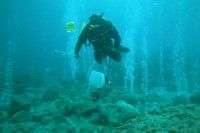Research discovers impact of ocean acidification on marine life

A Plymouth University academic researching the impact of ocean acidification on marine life is finding out exactly what we can expect as our seas soak up more and more carbon dioxide.
PhD student Vivienne Johnston is working with Dr. Jason Hall-Spencer at Plymouth focusing on the effects of ocean acidification on ecosystems close to volcanic carbon dioxide vents.
Her research published today (18th May) in the journal Global Change Biology found that seabeds in both temperate and tropical systems in the Mediterranean and Papua New Guinea had the same responses to ocean acidification, with some unexpected ecological winners in the corrosive waters.
With researchers from the University of Adelaide and the Australian Institute of Marine Science, the team assessed the impact of acidification on rocky shore ecosystems.
In both temperate and tropical systems, as levels of carbon dioxide increased, the researchers discovered that chalky seaweeds experienced significant corrosion due to acidified seawater. This is predicted to negatively alter their rigidity, growth rates and mortality, but surprisingly researchers found the some of these seaweeds thrived in a decalcified, fleshy form.
In contrast, the team discovered a substantial reduction in the number of sea urchins, which are important grazers, in acidified waters.
Vivienne said: “The reduction in sea urchins which have calcite skeletons and are therefore vulnerable to the corrosive effect of high carbon dioxide, is consistent with other studies globally. The fact that the some calcified algae thrive at high carbon dioxide, however, came as a surprise. Our present understanding of the impacts of ocean acidification has raised concern for the success of calcified algae as the oceans acidify but our results indicate that these seaweeds may be an exception.”
Further investigation revealed that rates of photosynthesis in algae Padina increased as more carbon dioxide became available. This fertilising effect of high carbon dioxide in combination with a reduction in grazing sea urchins predators is believed to be the reason for the unexpected success of the algae in such conditions.
Vivienne continued: “We have shown that important ecological shifts occur in temperate and tropical coastal habitats as the oceans acidify; as grazing sea urchins decline in number, some macroalgae may proliferate. These changes have potentially profound consequences for the structure and function of a variety of coastal habitats globally.”
Dr. Hall-Spencer added: “Our research shows that coastal ecosystems will almost certainly change as carbon dioxide levels increase. Some seaweeds can adapt and thrive but other important organisms, like corals and sea urchins, are wiped out. We see the same ecological responses to carbon dioxide on a global scale: to avoid the worst effects we need to reduce emissions and build resilience in coastal ecosystems.”
Vivienne’s research paper will be published in the journal Global Change Biology today.
Journal information: Global Change Biology
Provided by University of Plymouth



















